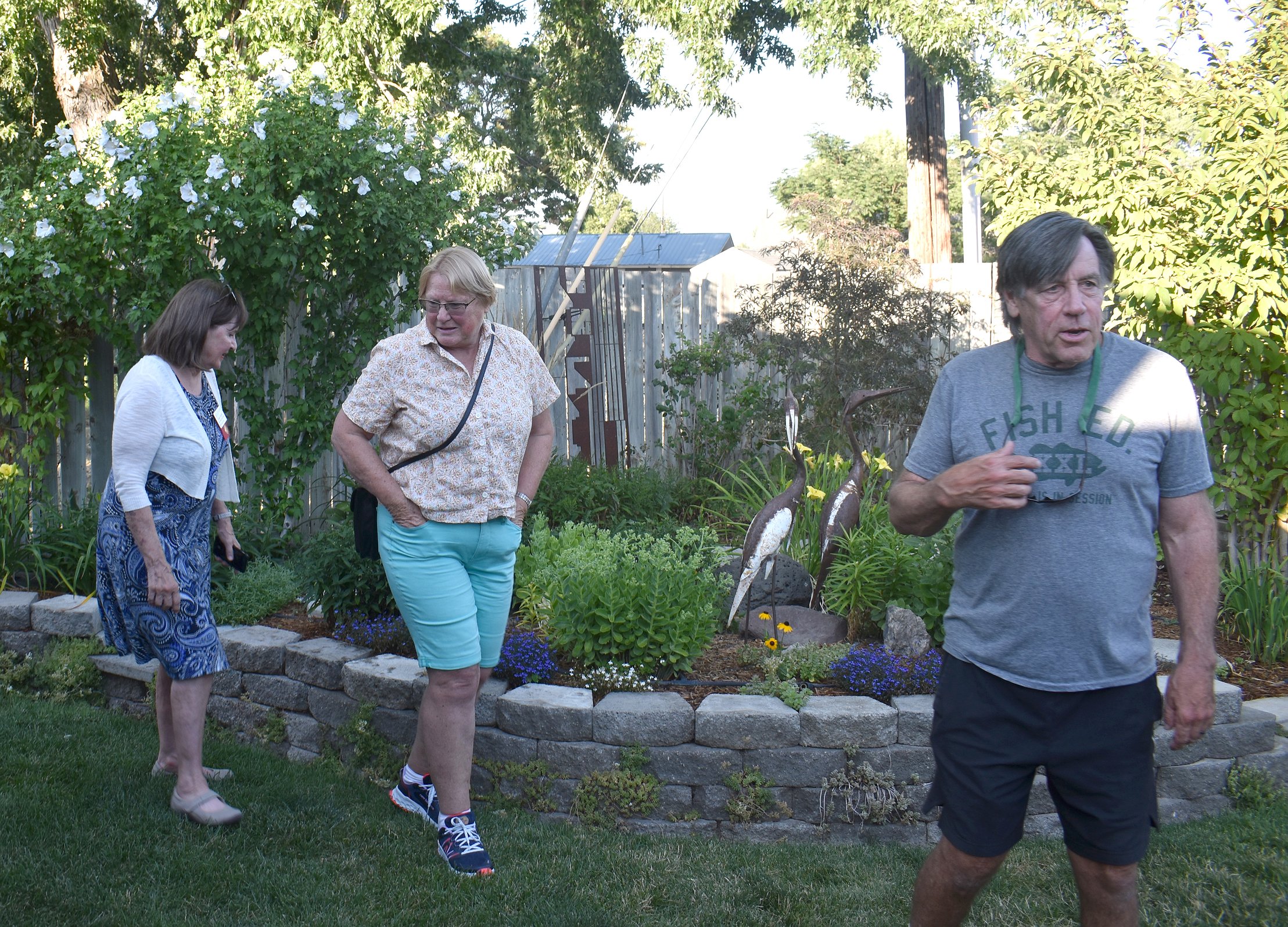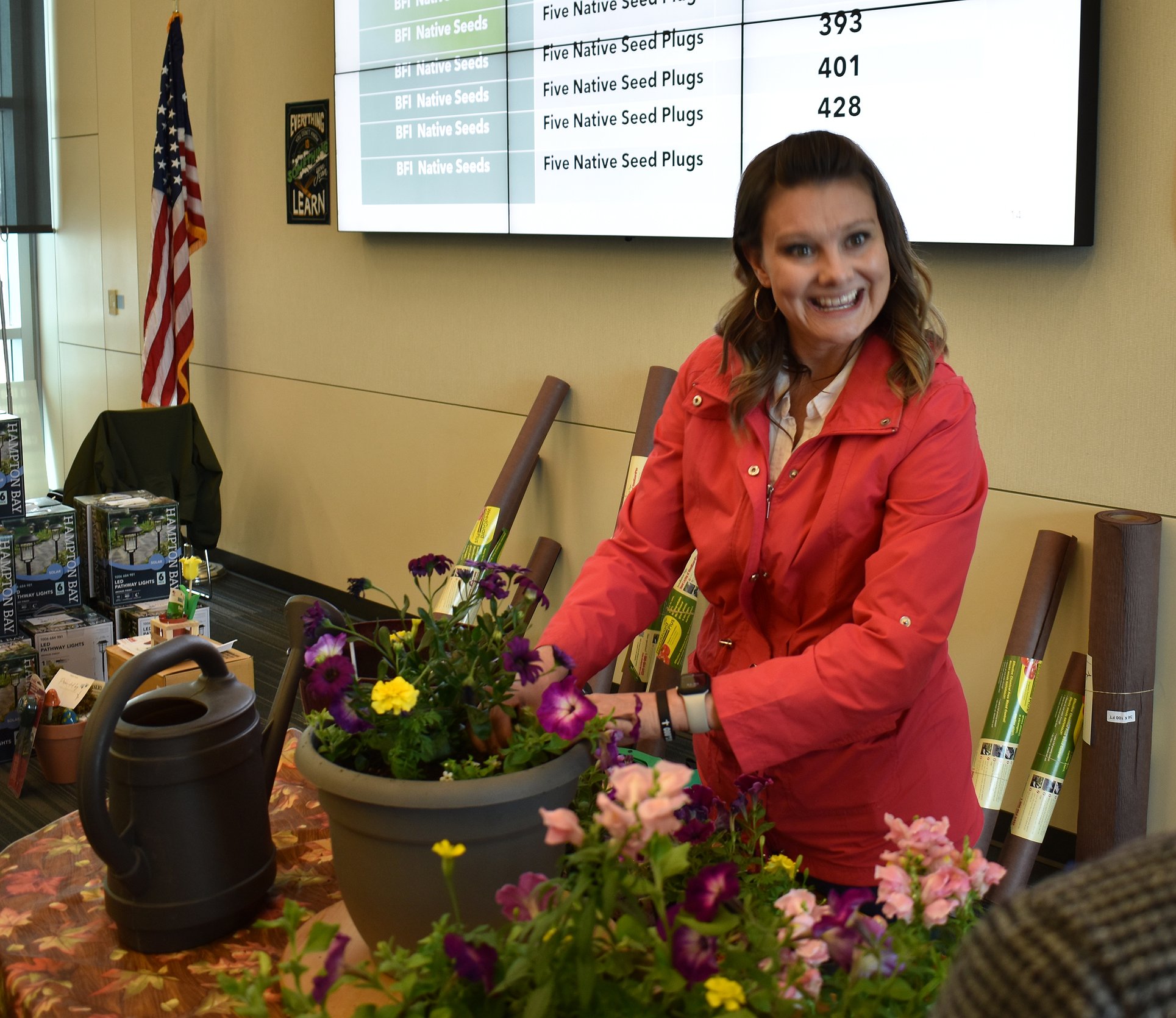Planting seeds of knowledge
JOEL MARTIN | Hagadone News Network | UPDATED 1 year, 7 months AGO
Joel Martin has been with the Columbia Basin Herald for more than 25 years in a variety of roles and is the most-tenured employee in the building. Martin is a married father of eight and enjoys spending time with his children and his wife, Christina. He is passionate about the paper’s mission of informing the people of the Columbia Basin because he knows it is important to record the history of the communities the publication serves. | July 16, 2024 3:00 AM
MOSES LAKE — Some people take playing in the dirt very seriously.
“(The Washington State University Master Gardener program) is for gardeners who want to help other people garden,” said Barbara Guilland, “You have a real interest in gardening. It's not just a place to learn it, it's a place to learn how to tell other people about it.”
Guilland hosted a garden party Thursday evening as part of an outreach effort to recruit more volunteers for the WSU Grant-Adams County Master Gardener program. Her own yard was an example of the gardener’s craft, with flowerbeds all around the house and a lily out front that looked to be about six feet tall. About 15 people came to the event, master gardener Mark Amara said, and a couple of them seemed to be serious about volunteering.
The Master Gardener program is an arm of the Washington State University Extension. It was formed in 1973 and came to Grant and Adams counties in 1982, Guilland said. The purpose of the program is to have a team of volunteer experts who can help the more casual gardener learn better techniques and grow better plants.
“It’s the opportunity to grow from knowledge and how to care for the environment, what's sustainable for gardening,” said Diane Escure, who coordinates the local master gardener program. “We had a recent symposium on water, and so much knowledge was given there … We're always looking at an opportunity to educate adults and kids. We've helped with elementary schools, planting little flowers for Mother's Day and watching the seedlings grow.”
There’s also a plant clinic that can be found regularly at the Moses Lake Farmers Market, where a master gardener will be on hand to answer questions, give advice or identify plants or pests.
Becoming a master gardener isn’t for the faint of heart. There’s a rigorous course through WSU that includes about 60 hours of online training and another 50 hours of volunteer work to become certified. Then there’s another 10 hours of advanced training and 25 hours of volunteer work every year after that.
Amara took the courses to become a master gardener in 2007, when he retired, he said.
“It’s pretty involved for people who are working, just because of the time commitment and the activities that we have. But it’s a really worthwhile activity. I enjoy doing the plant clinic and I write numerous articles for the newsletter.”
Amy Dinco, who attended the party, didn’t seem too daunted by the process. She grew up on a farm in New Hampshire, she said, and lives with her grandson on a patch of land just south of Moses Lake. She got hold of two truckloads of plants when Edwards Nursery closed in January, and planted it all.
“Daylilies and irises and chives, just everything,” she said. “Raspberry bushes. I have dug up more dirt lately.”
Dinco had wanted to be a farmer when she was young, she said, but ended up becoming a nurse instead. Now retired, she can pursue her passion for growing things.
“It’s like a second chance for me to do something I really wanted to do,” she said.
“The point of the Master Gardener program is that it's an educational program,” Guilland said. “But boy, do you learn a lot. There isn't a day that goes by that you don't learn something new, either by trying to help somebody else learn something, or just because you garden every day.”
Joel Martin may be reached via email at [email protected].
Becoming a master gardener
Fall training begins in September, with applications due by July 31. According to the WSU Master Gardeners’ outreach literature, volunteers will:
• Work with experienced master gardeners and hear firsthand how the program has enriched their lives.
• Discover the science-based techniques that make master gardeners leaders in sustainable landscaping and home gardening.
• Understand how master gardeners are pivotal in improving community health, creating green spaces, and supporting pollinator health.
• Connect with fellow gardening enthusiasts and forge lasting friendships.
• Gain access to ongoing education and expert resources.
For more information or to apply, visit https://bit.ly/Mgprogram24.
ARTICLES BY JOEL MARTIN

Space Burger booth open March 13-15
MOSES LAKE — Those who can’t wait for the Grant County Fair can get their Space Burger fix next weekend, according to an announcement from the Lioness Club of Moses Lake. The iconic Grant County sandwiches will be available at the Grant County Fairgrounds March 13-15, according to the announcement. There is no admission fee to get into the fairgrounds that weekend.

SENIOR EVENTS: March 2026
COLUMBIA BASIN — Plays, art shows, auctions and more await seniors in the Columbia Basin this month. Here are some opportunities to get out and about in March.

Valentine’s Day cards flood Brookdale Hearthstone with love
MOSES LAKE — Residents at Brookdale Hearthstone Assisted Living in Moses Lake got Valentine’s Day greetings from across the country last month. “I believe that the only states we have not received (cards from) yet are Vermont and Maine,” Lifestyle Director Imelda Broyles said Feb. 24. “We keep receiving new cards every single day. They have not stopped. My residents are in awe with every single one of the cards that we’ve been receiving.” The Hearts Across America project started as a way for children in school classrooms to exchange Valentine’s Day cards with classes in other states or even countries, but the idea has expanded to senior living facilities, according to the project’s social media.





